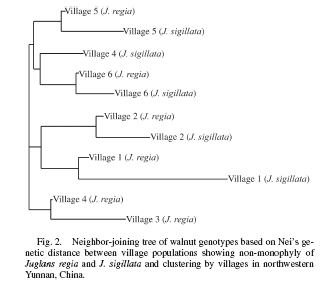- “Housed in the towering old 1926 Sonoma County Bank, it’s hard to miss the Seed Bank.” And who would want to anyway.
- Of apples, leaf miners and bacteria. Great story.
- Best synthesis and analysis of the Mongolian dzud story so far.
- Visualize your GPS data! Not agrobiodiversity, I know, but I don’t have another blog.
- Coca myths debunked. Sniff sniff.
- “Crop domestication and the first plant breeders” book charpter online.
- Rebranding Asian carp. Hard row to hoe. Thanks, Don.
- 190,000 year old clothes had lice. 190,000 year old humans had clothes?
- More citizen science stuff, this one on effect of climate change on plant phenology in the US.
- IFAD publishes bunch of livestock-related papers. ILRI, are you listening?
- “It’s 36 percent more efficient to grow grain for food than for fuel.” Good to have a number.
- Boffins do their aDNA thing on Chinese pigs, find continuity, multiple domestication, sweet and sour sauce recipe.
- Soil Association begs to differ on that whole
UKworld-needs-to-double-food-production thing.
Genetically engineered bananas work
Researchers in Israel reveal that several lines of genetically engineered bananas are more tolerant to the fungal disease black Sigatoka. This is interesting for lots of reasons. The variety they engineered, Cavendish, is practically the only variety in international trade (more’s the pity) so one could argue that this effort is protecting only those bananas enjoyed by relatively affluent consumers. It will not do much, other than as a proof of principle, for the hundreds of millions of people who depend on scores of banana and plantain varieties as a staple crop. Black Sigatoka is a menace, one of the reasons why conventionally-grown bananas receive more chemical fungicides than any other crop. But it could be argued that another disease, Panama disease Race 4, is currently a greater threat. It was Panama disease that wiped out the previous export banana, Gros Michel. And while there are fungicides against black Sigatoka, there are none effective against Panama disease.
But the thing I personally find most interesting about this research is my anticipation of the objections to it. None of the standard “scientific” objections can possibly apply, aside from possible effects on human health, which I imagine will be reasonably easy to test. I can’t wait.
Nibbles: Peach genome, P, Marine protected areas
- Size isn’t everything, genome edition.
- Nutrient efficiency of agriculture, phosphorus edition.
- Win-wins, fisheries edition.
Nibbles: Rice conservation and use, Tunisian genebank, Buno, Popcorn, Sustainability, Brazilian social networking, Strawberry breeding, Sunflower genomics, Climate change and fisheries
- Lots of Indian rice in the IRRI genebank. Any of it being used to develop drought-tolerant varieties?
- Lots of journalists in the Tunisian genebank.
- How they make coffee in Ethiopia.
- How they make popcorn the world over. You sometimes get popcorn (or popped sorghum) with coffee in Ethiopia, now I think of it. And since we’re on an Ethiopian kick, fancy some enjera? Gary Nabhan did.
- “Productivity vs. sustainability is a ‘false choice.’” Well I never. And probably not news to these people either, or these. But to these guys?
- A Twitter roundup from Embrapa.
- Ugly hybrid of two wild strawberries may cause allergies.
- Explanation of evolution of doubled genes in wild and cultivated sunflowers certainly causes pain in brain.
- Some good climate change news for the Atlantic croaker. Being a glass-totally-empty kinda guy I predict it tastes like shit.
Measuring diversity in Tibetan walnuts
You collect leaves from 220 walnut trees of two morphologically very distinct species (Juglans regia and J. sigillata) from two unrelated groups of families of villagers in each of six different villages in Tibet. You get the gene-jockeys to do their microsatellite stuff on the leaves. You calculate the contribution of species, of the kin relationship of the growers and of village to genetic diversity. You expect the biggest genetic differences to be between species.
You are wrong.
Yes, the “species,” which look totally different, are in fact indistinguishable genetically. But there were significant differences among villages, and smaller but still significant differences between unrelated families of farmers within villages. So, you might be particularly interested in certain traits, for improvement say (and so are the farmers: walnut landraces in this part of Tibet are often named after fruit phenotypes). But — in this case — morphology is not a great guide to the totality of the underlying genetic diversity. So you can’t use it alone for conservation.
Which is also the conclusion researchers in Benin arrived at in their study of another tree, akee (Blighia sapida), also just out. A conservation and use (domestication, in this case) strategy “should target not only the morphotypes recognized by local populations but should also integrate the population genetics information.”
Does this amount to a general rule?
